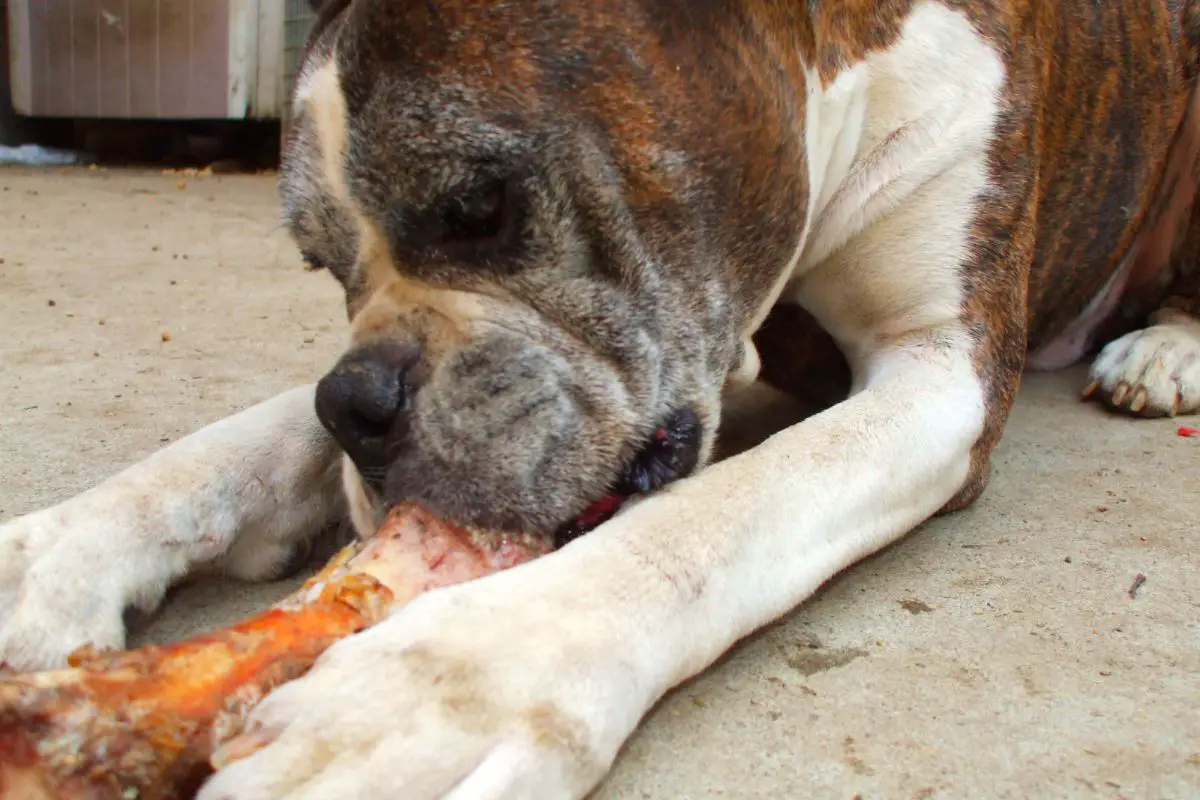This post contains affiliate links.
Whether you’re using it to spice up a soup, roast potatoes, or season meat, thyme is incredibly versatile and tasty. You may be tempted to share some of your thyme-infused foods with your dog, but can dogs eat thyme and is it safe?
Dogs can eat thyme, but should only consume it in moderation. Thyme provides numerous health benefits to dogs and is packed with nutrients and antioxidants. It’s known for its antimicrobial and antiseptic properties and, when incorporated into a balanced diet, it can also improve dogs’ digestion.
To learn more about the unique benefits thyme can offer to dogs, why you should practice moderation when feeding it, and what kind of thyme isn’t safe for your dog, read on.
Table of Contents
What Health Benefits Does Thyme Provide Dogs?
In a study conducted by the American Society for the Prevention of Cruelty against Animals (ASPCA), experts found that thyme is non-toxic to dogs, making it safe for consumption.
Thyme provides dogs with essential nutrients which include terpenoids, flavonoids, glycosides, and phenolic acids. These contents give thyme its antibacterial, antiseptic, antioxidative, sedative, antifungal, antihelminthic, carminative, and diaphoretic effects.
Let’s break down thyme’s contents and health benefits further.
Thyme Contains Thymol
Thyme contains thymol, a powerful substance that cures a lot of ailments. Here are the benefits of thymol:
- Thymol has antimicrobial properties used for the treatment of oral cavities infections. It’s a common ingredient in dogs’ toothpastes and can also fight gingivitis and bad breath in dogs.
- Thymol also improves dogs’ digestion.
Thyme Contains Various Vitamins and Minerals
Thyme contains vitamins A, K, C, manganese, iron, and calcium to build strong bones. It has antioxidant properties as well to fight free radicals and boost the immune system. Therefore, feeding it to your dog in moderate quantities can help make your dog less prone to disease infections.
Dogs Benefit From Thyme’s Antimicrobial Properties
Thyme helps treat fungal, viral, and bacterial pathogens in dogs. When bacteria and fungi appear on your dog’s skin, thyme employs its antiseptic, antibacterial properties to fight them. Studies also show that thyme engineers good fungicidal activity against otitis externa.
Thyme Can Promote a Healthy Digestive System
Thyme has antispasmodic and carminative properties that aid your dog’s digestion. These properties are also helpful for treating irritable bowel syndrome, dyspepsia, colitis, and indigestion in dogs, and even a light amount of thyme added to their diet can promote healthy digestion.
Thyme Can Eliminate Parasites
Thyme has been shown to have anthelmintic properties and can be used to remove hookworms from your dog’s system. However, you should consult with your veterinarian before proceeding with this treatment, as your vet may recommend a deworming medication in conjunction with thyme.
Thyme Enhances the Respiratory System
Thyme improves respiratory airflow and can effectively treat asthma, cough, and other infections and respiratory problems. Studies also show that it has expectorant properties to remove excess mucus, demulcent properties to treat irritation, and antitussive properties to prevent coughing.
Thyme Can Help Treat Urinary Tract Infections
The antimicrobial and antiseptic properties contained in thyme also mean that it can prevent urinary tract infections in your dog. Even if your dog’s never had a urinary tract infection, your vet may recommend adding some thyme to his diet to keep his urinary tract cleansed and healthy.
If you’re unsure about adding thyme to your dog’s diet, or your dog is showing symptoms of urinary tract infections that persist, always consult with your vet for further assistance.
Dangers/Side Effects of Consuming Excess Thyme
Much like every other food or snack, your dog should consume thyme in small quantities. Too much thyme can lead to digestive and gastrointestinal inflammation, and indigestion.
Avoid feeding your dog thyme in the following manners to prevent physical and health issues:
- Thyme essential oil; refrain from feeding your dog any kind of essential oil, including thyme essential oil, because it can cause adverse reactions such as vomiting, seizures, and diarrhea.
- If consumed in excess, thyme slows blood clotting, thereby increasing the bleeding rate in the event of an accident.
- Thyme contains high amounts of fiber, leading to indigestion, vomiting, and diarrhea if taken in excessive amounts.
What Is Spanish Thyme and Is It Safe for Dogs?
Although non-toxic to humans, Spanish thyme is dangerous to dogs. When ingested by dogs, Spanish thyme can be very harmful and lead to poisoning.
Spanish thyme is a type of thyme that isn’t safe for dogs’ consumption. It has a smell similar to oregano, small blue or white flowers, and green leaves with a purple hue. It proliferates with thick foliage as an indoor or outdoor plant, and should be kept away from dogs because it can be poisonous.
Spanish thyme contains diterpene, thymol, eugenol, and carvacrol, which lowers blood pressure and irritates a dog’s skin and gastrointestinal tract.
Despite the dangers of Spanish thyme to dogs, some dog owners still mistakenly feed it to their dogs because they misconceive its other names.
Some other familiar names of Spanish thyme include:
- Indian borage
- Bread and butter thyme
- East Indian thyme
- Stinging thyme
- Coleus
- Cuban oregano
- Country borage
- Spanish oregano
What Causes Spanish Thyme Poisoning in Dogs?
The chemical compounds in Spanish thyme are responsible for poisoning in dogs. The foliage contains dipertine, which is harmful because it lowers dogs’ blood pressure. The plant’s oils contain carvacrol, eugenol, methyl eugenol, and thymol, which can cause dermatitis and gastrointestinal issues.
What Are the Symptoms of Spanish Thyme Poisoning?
If you notice any of the following symptoms in your dog, there’s a huge probability it has ingested Spanish thyme. However, the severity of the symptoms may depend on the amount of Spanish thyme consumed.
Here are some of the symptoms of Spanish thyme poisoning:
- Vomiting
- Seizures
- Diarrhea (sometimes bloody diarrhea)
- Anorexia
- Lethargy
- Swollen tongue and mouth
- Muscle tremors
- Weakness
- Excessive drooling
- General malaise
- Difficult breathing
- Depression
Diagnosis for Spanish Thyme Poisoning
As explained above, Spanish thyme is non-toxic to humans but highly toxic and harmful to your dog, and often leads to poisoning. If you see your dog showing some of the symptoms of Spanish thyme poisoning, visit your veterinarian immediately.
If you suspect Spanish thyme poisoning, maybe from having the plant at home or in your environment, you should take the plant along with you on your visit to the veterinarian to hasten the diagnosis.
Your veterinarian may perform the following:
- Test the contents of your dog’s stomach for traces of Spanish thyme.
- Carry out the physical examination, blood work, urinalysis, and biochemistry profile.
- Carry out further laboratory testing such as an ultrasound to check the abdominal areas for any inflammations.
Treatment for Spanish Thyme Poisoning
Here are some of the treatments for thyme poisoning:
- It would be best to rush your dog to the veterinarian with a sample of the Spanish thyme for easy diagnosis.
- The veterinarian will flush out the contents of your dog’s stomach by inducing vomiting. In severe cases, your veterinarian may perform a process called gastric lavage, where a tube is inserted into your dog, and the contents of the stomach flushed out through the tube.
- Since Spanish thyme poisoning can cause heart palpitations and lead to arrhythmia in your dog, your veterinarian will monitor your dog’s heart to determine the extent of poisoning and treat accordingly.
- The veterinarian may also give fluids to your dog if they vomited or suffered diarrhea for hydration and to restore lost nutrients and electrolytes.
Can Your Dog Recover From Spanish Thyme Poisoning?
Your dog can recover from Spanish thyme poisoning with appropriate care and treatment. Treatments may include veterinary assistance, a bland diet consisting of boneless and skinless chicken, and extensive rest to rebuild energy levels.
How To Prevent Spanish Thyme Poisoning
The best way to stop your dog from eating Spanish thyme is to remove this plant from inside and outside the house altogether. Keep your dog on a tight leash when taking walks, especially if there’s any Spanish thyme around your neighborhood.
However, if, for any reason, Spanish thyme becomes an essential plant to have around your home, take the following precautions to stop your dog from eating it, these are:
- Move the plant out of reach from your dog; you may need to build cages around it.
- Use a motion-sensitive repellent that’ll send a signal, such as blowing a horn or air and spraying water when your dog approaches the plant. I prefer to use the COSTWAY Motion Activated Animal Repellent (available on Amazon.com). This motion-sensor repellent pays attention to your dog’s safety, while repelling it away from your plants.
- Spray the plant with lemon juice diluted with water because dogs avoid citrus smells, which may deter them.
How To Safely Feed Thyme to Your Dog in Moderation
Sprinkle a little fresh or dried thyme leaves on your dog’s wet or dry food to make it tasty and for health benefits. It would be best if you did so in the following manner:
- Administer it in moderation; One teaspoon (2.6 g) per pound of dog food.
- Choose the leaves that haven’t been sprayed with pesticides.
- Home-grown thyme leaves in your garden have more nutrients and are fresher.
- Home-grown thyme leaves also ensure that no pesticides or herbicides have been used.
- You can feed your dog either fresh or dried leaves on their dog food and treats.
Conclusion
Thyme is packed with lots of health benefits to dogs. It contains antioxidant, antimicrobial, antibacterial, and antiseptic properties. These properties contribute to your dog’s general wellness by promoting a healthy digestive system, respiratory system, and urinary tract.
However, despite all these numerous benefits, thyme should still be consumed in moderation to avoid potential health complications.
Furthermore, Spanish thyme is considered toxic to dogs. It can lead to poisoning with symptoms like vomiting, diarrhea, seizures, weakness, difficulty breathing, etc. If you notice any of these symptoms, take your dog to your veterinarian immediately for treatment.
Related Articles
- Can Dogs Eat Ketchup? Read This First!
- Can Dogs Eat Crab Apples? Is It Safe?
- Can Dogs Eat Gummy Bears? (We Ask the Experts)
- Can Dogs Eat Sour Cream? (We Find Out)
- Can Dogs Eat Cheerios? (We Find Out)
Sources
- ASPCA: Toxic and Non-toxic Plants
- NCBI: Pharmacological Properties and Molecular Mechanisms of Thymol
- PubMed.gov: Antimicrobial activity of thyme oil, oregano oil, thymol and carvacrol against sensitive and resistant microbial isolates from dogs with otitis externa
- NCBI: Veterinary Herbal Medicine: A System-Based Approach
- wikiHow: How to stop your dog from eating your plants
- Wikipedia: Arrhythmia
Mrdogfood.com is a participant in the Amazon Services LLC Associates Program, an affiliate advertising program designed to provide a means for sites to earn advertising fees by advertising and linking to Amazon.com. We also participate in other affiliate programs which compensate us for referring traffic.





